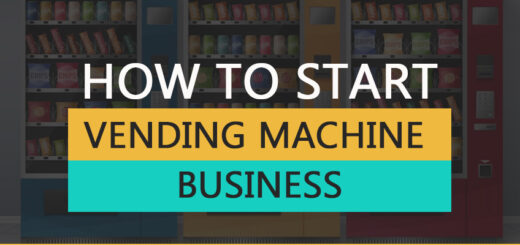How to Start a Vending Machine Business

Starting a vending machine business can be a lucrative and flexible venture. With the right strategies and planning, you can tap into a growing market and generate passive income. In this guide, we will walk you through the essential steps to launch your vending machine business successfully. From conducting market research to choosing the right products and locations, we will cover everything you need to know to embark on this exciting entrepreneurial journey.
How to Start a Vending Machine Business?
- Conducting Market Research
- Developing a Solid Business Plan
- Financing Your Vending Machine Business
- Selecting the Right Vending Machines
- Finding Lucrative Locations
- Stocking the Right Inventory
- Installation and Maintenance
- Marketing and Promotions
Getting your vending machine business started quickly requires efficient planning and execution. Now lets start by understanding each step in detail –
1. Conducting Market Research
Conducting market research is crucial for a vending machine business. Start by identifying your target market and assessing their needs and preferences. Determine the demand for specific products and identify any gaps or untapped opportunities. Analyze the –
- competition
- studying their offerings
- pricing
- and locations
Gather data on high-traffic areas, such as offices, schools, or shopping centers, to find strategic placement opportunities. Research local regulations and permits related to vending machines. By conducting comprehensive market research, you can gain valuable insights to make informed decisions, tailor your offerings, and position your vending machine business for success.
2. Developing a Solid Business Plan
A business plan for a vending machine business typically includes the following four key points:
- Executive Summary: A concise overview of your vending machine business, summarizing its mission, goals, target market, and key strategies.
- Market Analysis: A comprehensive assessment of the target market, including customer demographics, preferences, and behavior. Identify market trends, competition, and opportunities for growth.
- Operational Plan: Outline the operational aspects of your vending machine business, including machine selection and procurement, location scouting, inventory management, maintenance procedures, and customer service strategies.
- Financial Projections: Present a financial plan that includes startup costs, revenue forecasts, expense projections, and a break-even analysis. Discuss pricing strategies, profit margins, and potential funding sources if needed.
These four points cover the essential elements of a business plan for a vending machine business, providing a clear and strategic roadmap for its success.
3. Financing Your Vending Machine Business

When it comes to financing your vending machine business, here are three key points to consider:
- Startup Costs and Budgeting: Determine the total cost required to launch your vending machine business, including the purchase or lease of vending machines, inventory, initial supplies, location fees, permits, and any other associated expenses. Create a comprehensive budget that outlines both one-time startup costs and ongoing operational expenses.
[ Read more: Tips for Managing Small Business Finances] - Funding Options: Explore various funding sources to secure the necessary capital for your business. Options may include personal savings, loans from financial institutions, Small Business Administration (SBA) loans, crowdfunding, or seeking investment from partners or angel investors. Research each option thoroughly, considering factors such as interest rates, repayment terms, collateral requirements, and the impact on your business’s financial health.
- Building Relationships with Suppliers: Establish strong relationships with reliable suppliers to ensure a steady and cost-effective supply of products for your vending machines. Negotiate favorable pricing, explore bulk purchasing options, and consider any volume discounts available. Building strong supplier relationships can help you manage costs and maintain a consistent inventory, contributing to the financial success of your vending machine business.
By carefully considering these three points—startup costs and budgeting, funding options, and supplier relationships—you can develop a solid financial foundation for your vending machine business and ensure its long-term sustainability.
4. Selecting the Right Vending Machines
Selecting the right vending machines for your business is a crucial decision that can impact your success. Here are three key factors to consider:
- Machine Types and Features: Evaluate different types of vending machines available in the market, such as snack machines, beverage machines, combo machines, or specialized machines for specific products. Consider factors like capacity, size, and product compatibility. Look for machines with user-friendly interfaces, efficient energy consumption, and advanced payment options like cashless or mobile payments. Choose machines that align with your target market’s preferences and the product range you plan to offer.
- New vs. Used Machines: Decide whether to purchase new or used vending machines based on your budget, availability, and desired warranty coverage. New machines typically offer the latest features, improved reliability, and manufacturer support, but they come at a higher cost. Used machines can be a more affordable option but require thorough inspection to ensure they are in good working condition. Consider the longevity, maintenance history, and warranty coverage when making your decision.
- Maintenance and Repairs: Consider the maintenance requirements and availability of repair services for the vending machines you choose. Look for machines from reputable manufacturers with a track record of reliability and good customer support. Assess the ease of maintenance, availability of spare parts, and the proximity of service providers for quick repairs. Factor in the cost and convenience of regular maintenance and repairs to ensure minimal downtime and optimal performance of your vending machines.
By carefully considering the machine types and features, new vs. used options, and maintenance and repair considerations, you can select the right vending machines that suit your business goals and provide a seamless experience for your customers.
5. Finding Lucrative Locations
When it comes to finding lucrative locations for your vending machine business, consider the following two points:
- High-Traffic Areas: Identify areas with significant foot traffic, such as office complexes, shopping malls, schools, hospitals, transportation hubs, and recreational facilities. These locations offer a higher likelihood of attracting potential customers. Research local demographics, customer behavior, and the presence of competing vending machines to ensure the viability of your chosen spots.
- Establishing Partnerships: Approach businesses, property owners, and facility managers to establish partnerships for placing your vending machines. Highlight the benefits of having a vending machine on their premises, such as added convenience for customers, potential revenue share or lease agreements, and increased foot traffic. Negotiate mutually beneficial contracts or agreements that outline responsibilities, pricing, placement options, and maintenance procedures.
By focusing on high-traffic areas and cultivating partnerships, you can increase the visibility and profitability of your vending machine business. It’s important to regularly evaluate the performance of your locations and be open to relocating machines if necessary to optimize revenue generation.
6. Stocking the Right Inventory
Stocking the right inventory is essential for a successful vending machine business. Consider these key points when managing your inventory:
- Research customer preferences and trends to understand what products will sell well in your target market.
- Maintain a diverse selection of popular and in-demand items, ensuring a balance between healthy options, snacks, beverages, and any specialty products you offer.
- Regularly assess and update your inventory based on sales data and customer feedback. Optimize your product mix to maximize sales and meet customer expectations.
By stocking the right inventory, you can cater to customer preferences and drive profitability in your vending machine business.
7. Installation and Maintenance
Proper installation and maintenance are crucial for the smooth operation of your vending machine business. Follow these steps to ensure success:
- Install machines accurately, considering visibility, accessibility, and compliance with local regulations.
- Regularly clean and sanitize machines to maintain hygiene standards.
- Implement routine maintenance procedures, such as inspecting coin mechanisms, bill acceptors, and refrigeration systems.
- Establish a restocking schedule to ensure machines are always adequately supplied with fresh products.
- Promptly address any issues or malfunctions to minimize downtime and ensure customer satisfaction.
- Train staff or outsourced technicians to perform maintenance tasks and handle repairs as needed.
By prioritizing proper installation and regular maintenance, you can maximize machine performance, customer experience, and overall profitability.
8. Marketing and Promotions
Effective marketing and promotions are essential to attract customers and drive sales for your vending machine business. Consider the following strategies:
- Develop a compelling brand identity and logo that resonates with your target market.
- Utilize eye-catching signage on machines and in surrounding areas to capture attention.
- Leverage online platforms and social media to promote your business, engage with customers, and share special offers.
- Implement loyalty programs, discounts, or limited-time promotions to incentivize repeat business.
By combining a strong brand presence, strategic signage, online visibility, and customer incentives, you can effectively market your vending machine business and create a buzz that attracts customers and increases revenue.
Pros and Cons of Starting a Vending Machine Business
Starting a vending machine business has its share of advantages and disadvantages. Here are some pros and cons to consider:
Pros of Starting Vending Machine Business
- Passive Income: Vending machines can generate passive income as they operate 24/7 without the need for constant supervision or labor-intensive work.
- Flexibility: You can choose your own working hours and manage the business at your convenience. This flexibility allows you to pursue other interests or maintain a part-time job alongside your vending machine business.
- Scalability: It’s relatively easy to scale your vending machine business by adding more machines in profitable locations. This scalability offers potential for expansion and increased revenue.
- Diverse Product Range: Vending machines allow you to offer a variety of products to cater to different customer preferences, from snacks and beverages to healthier options and specialty items.
- Targeted Locations: By strategically placing vending machines in high-traffic areas, you can target a specific audience and increase the chances of generating consistent sales.
Cons of Starting Vending Machine Business
- Initial Investment: Starting a vending machine business requires a significant upfront investment, including the purchase or lease of machines, inventory, location fees, and operational costs. Financing or securing capital can be a challenge for some entrepreneurs.
- Maintenance and Repairs: Regular maintenance, stocking, and servicing of machines are essential for optimal performance. This ongoing responsibility can be time-consuming and may require additional costs for repairs and maintenance services.
- Competitive Market: The vending machine industry can be competitive, especially in highly sought-after locations. Competing against other vending operators or alternative food and beverage options can pose challenges in attracting customers.
FAQ
1. How much does it cost to start a vending machine business?
The cost to start a vending machine business varies depending on factors such as machine types, inventory, location fees, and maintenance costs. On average, startup costs can range from a few thousand to tens of thousands of dollars.
2. What types of products can I sell in vending machines?
Vending machines can dispense a wide range of products, including snacks, beverages, healthy food options, personal care items, and even electronics. It ultimately depends on your target market and the demand in your specific location.
3. How do I find profitable locations for my vending machines?
Look for high-traffic areas such as office buildings, shopping malls, schools, hospitals, and transportation hubs. Establish partnerships with businesses and property owners to secure prime locations.
4. How often should I restock my vending machines?
The frequency of restocking depends on factors like sales volume, product shelf life, and customer demand. Regularly monitor inventory levels and restock before items run out to ensure consistent availability.
5. What are the regulations and permits required to operate a vending machine business?
Regulations vary by location, so research local laws and obtain necessary permits and licenses. These may include business licenses, health department approvals, and compliance with vending machine ordinances.













